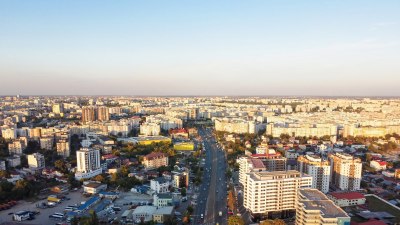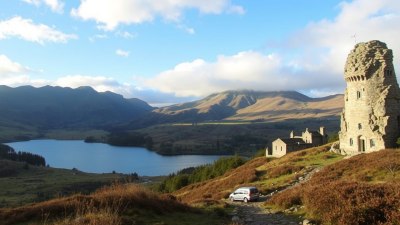Why Traveling to Historic Places Can Make You See the Future Differently
Discover how visiting historic places reshapes your perspective on the future and enriches your understanding of time.

Traveling to historic places is a transformative experience that not only connects us with the past but also shapes our view of the future. Historical sites are not merely remnants of a bygone era; they are vibrant checkpoints of human achievement, resilience, and evolution. When we walk through ancient ruins, stand atop majestic castles, or wander through museums filled with artifacts, we are invited to reflect on the stories that these places hold. These reflections can alter our perceptions of progress and the trajectories we envision for our futures. In this article, we will explore the myriad ways in which visiting historic places can shift our perspectives, providing insights into culture, innovation, and humanity’s enduring spirit.
The Lessons of History
At their core, historic sites are repositories of knowledge. They encapsulate lessons learned through centuries of human experience. The rise and fall of civilizations teach us about resilience, adaptability, and the consequences of choices made in times of conflict and peace. For instance, visiting the ruins of the Roman Empire allows us to comprehend the intricate dynamics of power, governance, and cultural exchange. Similarly, the remnants of ancient Greece highlight the foundations of democracy and philosophy that continue to influence our societal structures. These lessons remind us history is not merely a record of what once was; it is a guide for what could be. Exploring these historic places invites us to introspect and consider how the lessons of the past can inform our future decisions.
Connection to Cultural Heritage
Traveling to historic sites also reinforces our connection to cultural heritage. Every culture has its own unique history, and immersing ourselves in these narratives fosters a deeper appreciation for diversity. For example, engaging with Native American historical sites can illuminate the resilience and rich traditions of Indigenous peoples, while visiting ancient temples in Southeast Asia can reveal the intricate ways spirituality and artistry intertwine. This cultural exploration not only enriches our understanding of the world but also nurtures empathy and respect for other communities. By recognizing the beauty and wisdom of varying cultural heritages, we become more open-minded and inclusive, envisioning a future that values unity in diversity.
Innovation Born from Reflection
History is filled with instances of innovation born from reflection—a concept evident in many historic destinations. For example, inspired by the challenges faced during the Great Depression, architects and planners reimagined urban spaces, leading to modern infrastructure that promotes sustainability and community. By visiting historic places, we are reminded of the critical importance of reflection as a catalyst for innovation. Understanding the contexts in which past innovators thrived can ignite our own creativity, pushing us to think outside the box when addressing contemporary challenges. This blend of past influence and present need empowers us to contribute to future advancements through innovative thinking.
Experiencing Change Over Time
Another way historic travel can reshape our future outlook is by witnessing the evolution of societies firsthand. Historic sites often encapsulate the transformations that have occurred within a culture, reflecting shifts in technology, social norms, and environmental interactions. For instance, seeing the remnants of the Berlin Wall presents a powerful narrative about division turned unity, encapsulating the political changes that shape modern Europe. Understanding these transitions helps clarify that change is a constant aspect of human existence. It reminds us that today’s challenges are inherently transient and that the future is not predetermined but shaped by our actions and decisions. This awareness encourages resilience and optimism, as we recognize our agency in navigating the tides of change.
Reflections on Time
Traveling through time, metaphorically speaking, allows us to see the past as a continuum rather than a series of isolated events. The fluidity of time becomes apparent when we juxtapose historic experiences with contemporary life. In cities like Kyoto, where traditional architecture and modern development coexist, we witness a culture that embraces its history while adapting to present-day needs. This harmonious blend offers a unique perspective on how the past can coexist with the future. When we grasp this interconnected timeline, we begin to visualize our role in this continuity. It empowers us to contribute positively to the narrative, understanding that each moment builds upon the previous one, advancing us toward a promising future.
The Power of Storytelling
Every historic site has a story to tell. From ancient civilizations to modern conflicts, these narratives are powerful in shaping our collective consciousness. Engaging with these stories helps us recognize our shared humanity, regardless of geographical boundaries. Traveling to narrative-rich environments, such as the Auschwitz-Birkenau Memorial, confronts us with the darker aspects of humanity, emphasizing the importance of remembrance and commitment to a better future. Alternatively, visiting places like the Martin Luther King Jr. Memorial reminds us of the progress made in civil rights, inspiring continued advocacy for justice and equality. These stories compel us to envision a future grounded in compassion, understanding, and action. The connections we forge through these narratives help reinforce the idea that we can shape our destinies collectively.
Personal Growth and Discovery
Traveling to historic places often sparks personal growth and self-discovery. The act of stepping into a space steeped in history invites us to reflect on our values, beliefs, and aspirations. While exploring ancient ruins, we may ponder what kind of legacy we wish to leave behind, leading to a deeper understanding of ourselves. This introspective journey can significantly influence our future aspirations. Understanding our history and identifying patterns in our own lives empower us to set informed intentions for the future. For instance, visiting sites like the Pyramids of Giza can inspire a sense of awe and ambition, prompting us to push boundaries in our own lives. The realization that greatness has been achieved throughout history can invigorate our own pursuits, fueling our determination to make a lasting impact.
Environmental Awareness and Responsibility
Historic travel also fosters a greater awareness of environmental sustainability and responsibility. Many historic sites are inextricably linked to the landscapes they occupy. For example, exploring the terraced fields of the rice farmers in the Philippines provides insight into sustainable farming practices that have evolved over generations. By witnessing these practices firsthand, we cultivate an appreciation for the delicate balance between human activity and nature. As we learn about the sustainability efforts of our ancestors, we become motivated to continue such practices in the present. This newfound awareness shapes a future where we prioritize environmental stewardship, recognizing that our actions today have lasting implications for generations to come.
Traveling to historic places is more than an exploration of the past; it is a journey that invites us to reimagine our future. By absorbing the lessons of history, connecting with cultural heritage, fostering innovation, and reflecting on time, we inevitably alter our perspectives on what lies ahead. The stories we encounter compel us to grow, promote innovation, and embrace responsibility, ultimately shaping a more compassionate and informed future. Each journey we embark upon becomes a contribution to a narrative far greater than ourselves, one that bridges the past with the future. So, when you travel to historic places, remember that you are not just walking through history; you are stepping into your future.











